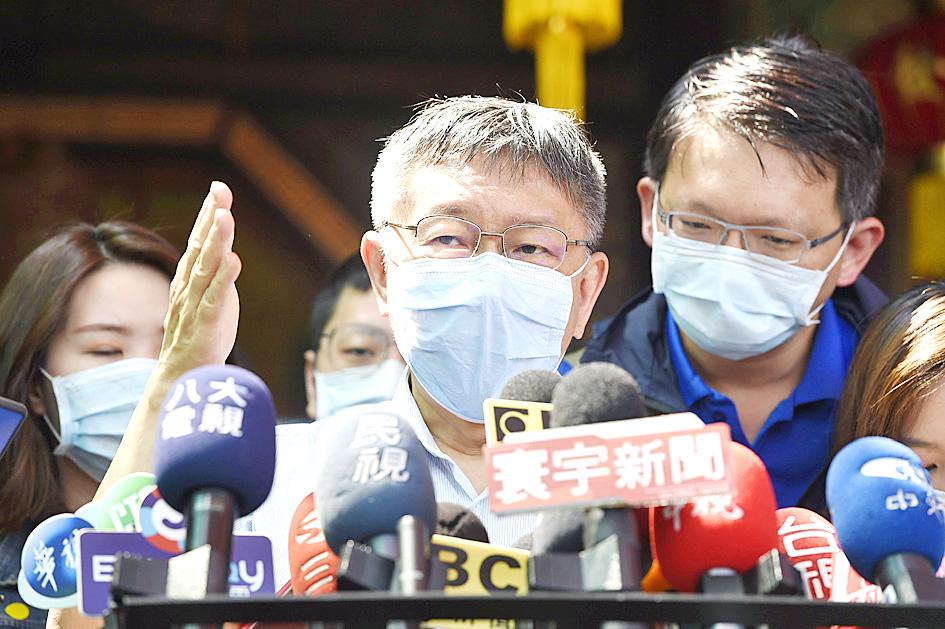The Central Epidemic Command Center’s (CECC) instruction that local governments can decide whether hostess clubs and dance halls can reopen is a typical example of the central government’s unwillingness to take responsibility, Taipei Mayor Ko Wen-je (柯文哲) said yesterday.
Ko made the remark in response to media queries on the sidelines of a blessing ceremony held at Taipei’s Sung Shan Tsu Huei Temple (松山慈惠堂) yesterday morning.
The CECC on April 9 ordered all hostess clubs and dance halls to suspend operations after a case of locally transmitted COVID-19 involving a hostess in northern Taiwan was confirmed the day before.

Photo: George Tsorng, Taipei Times
Minister of Health and Welfare Chen Shih-chung (陳時中), who heads the CECC, on Friday said that local governments should assess whether businesses temporarily suspended due to disease prevention conform to disease prevention and safety requirements before giving them the green light to reopen.
“I know firsthand that the central government’s instruction that ‘local governments can decide whether to allow hostess clubs and dance halls to resume operations’ is a typical example of its unwillingness to take responsibility,” Ko said.
“Ordering the businesses to suspend operations was easy, but no one wants to take the responsibility for reopening them,” he said, adding that he told a meeting of Taipei City Government officials that the businesses should be allowed to reopen, but they told him that none of the other mayors had dared to make the decision.
Taiwan had not reported a new domestic case in 27 days, so hostess clubs and dance halls should be allowed to resume operations, Ko said.
Whether school campuses and other public spaces should be reopened to the public also requires further discussion, he said, adding that he would convene department officials to discuss the issue and establish standard operating procedures.
Local governments have difficulty verifying the eligibility of uninsured workers who apply to the central government’s NT$10,000 COVID-19 relief grant, but Taipei would handle most of the cases, only sending a few to be reviewed by the Ministry of Health and Welfare, he added.
Asked about Ko’s remarks, Chen later yesterday said that the central government has issued the guidelines, but that local governments know the businesses in their area better.
“You cannot expect us [CECC heads] to inspect hostess clubs every day,” he said, adding that only local governments know if they have the personnel to inspect the businesses and ensure that they comply with the requirements.
The same is true of reviewing uninsured workers who file grant applications — local governments are better situated to conduct the initial review, giving out the payment if an applicant is clearly eligible and only seeking a final review from the ministry if truly necessary, Chen added.
Local government leaders are elected by voters, so they have the right to raise questions about the relief program or make suggestions, Chen said, adding that the ministry would discuss any problems they brought up and humbly accept any suggestions.

A preclearance service to facilitate entry for people traveling to select airports in Japan would be available from Thursday next week to Feb. 25 at Taiwan Taoyuan International Airport, Taoyuan International Airport Corp (TIAC) said on Tuesday. The service was first made available to Taiwanese travelers throughout the winter vacation of 2024 and during the Lunar New Year holiday. In addition to flights to the Japanese cities of Hakodate, Asahikawa, Akita, Sendai, Niigata, Okayama, Takamatsu, Kumamoto and Kagoshima, the service would be available to travelers to Kobe and Oita. The service can be accessed by passengers of 15 flight routes operated by

Chinese spouse and influencer Guan Guan’s (關關) residency permit has been revoked for repeatedly posting pro-China videos that threaten national security, the National Immigration Agency confirmed today. Guan Guan has said many controversial statements in her videos posted to Douyin (抖音), including “the red flag will soon be painted all over Taiwan” and “Taiwan is an inseparable part of China,” and expressing hope for expedited reunification. The agency last year received multiple reports alleging that Guan Guan had advocated for armed reunification. After verifying the reports, the agency last month issued a notice requiring her to appear and explain her actions. Guan

GIVE AND TAKE: Blood demand continues to rise each year, while fewer young donors are available due to the nation’s falling birthrate, a doctor said Blood donors can redeem points earned from donations to obtain limited edition Formosan black bear travel mugs, the Kaohsiung Blood Center said yesterday, as it announced a goal of stocking 20,000 units of blood prior to the Lunar New Year. The last month of the lunar year is National Blood Donation Month, when local centers seek to stockpile blood for use during the Lunar New Year holiday. The blood demand in southern Taiwan — including Tainan and Kaohsiung, as well as Chiayi, Pingtung, Penghu and Taitung counties — is about 2,000 units per day, the center said. The donation campaign aims to boost

The Central Weather Administration (CWA) said a magnitude 4.9 earthquake that struck off the coast of eastern Taiwan yesterday was an independent event and part of a stress-adjustment process. The earthquake occurred at 4:47pm, with its epicenter at sea about 45.4km south of Yilan County Hall at a depth of 5.9km, the CWA said. The quake's intensity, which gauges the actual effects of a temblor, was highest in several townships in Yilan and neighboring Hualien County, where it measured 4 on Taiwan's seven-tier intensity scale, the CWA said. Lin Po-yu (林柏佑), a division chief at the CWA's Seismological Center, told a news conference